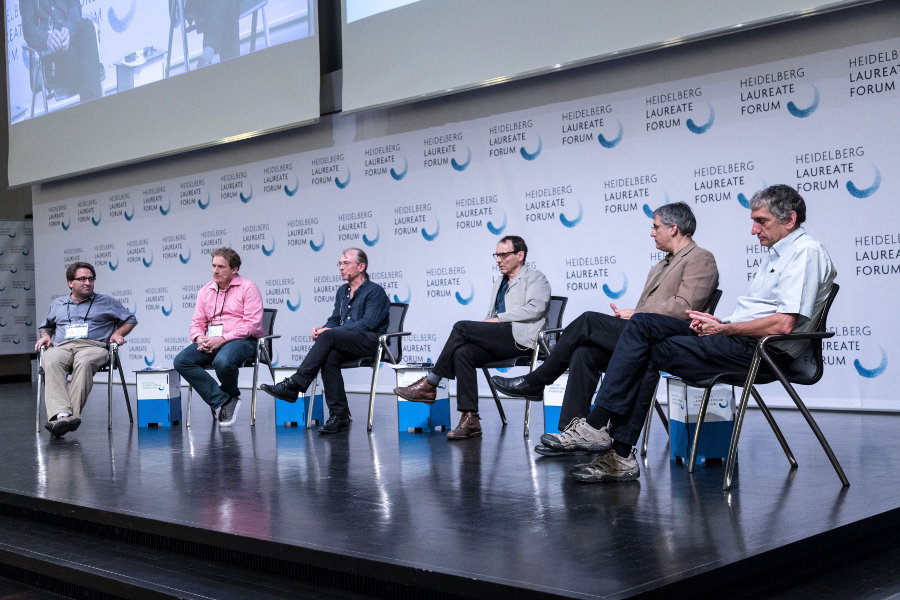Women in Computer Science and Mathematics
BLOG: Heidelberg Laureate Forum

Two years ago, I had the opportunity to talk to Lenore Blum, one of the invited speakers at the 3rd HLF in 2015 and a professor of computer science at Carnegie-Mellon university, who had been actively transforming her university’s undergraduate program in computer science, one of the top-ranked such programs in the US, for greater balance.
Transforming Carnegie-Mellon
Before 1995, female students admitted to the program amounted to less than 10% of the total, and many of those dropped out or changed majors. By now, the percentage of female students is up to almost 50% and, more importantly, retention rates – students finishing the program successfully – are up for both female and male students. The course of studies is still as rigorous and challenging as before, if not more so, and the quality of the applicants, as measured by the test scores common in the US, has actually increased.
But in addition, a sustained shift from pre-existing programming skills to more general qualifications, mentoring programs and what amounted to a shift in culture (I have written about this in detail in Beyond mere programming [August 28, 2015] and Changing the culture [1 September 2015]) has made the program more balanced.
…but have things changed?
When I talked to Lenore Blum at this year’s HLF, and when I later talked to Ragni Piene, who is a professor of mathematics at Oslo university, both struck a somewhat less optimistic note. Earlier in the week, there had been a meeting of female HLF participants. In some respects, both Blum and Piene noted, the young researchers’ accounts of their experiences had been depressingly similar to those of their considerably older peers.

Some possible solutions, as in the case of the Carnegie-Mellon undergraduate program, would involve systemic change – the kind of change that is likely to benefit male and female students alike. For example: In Norway, as Piene notes, every PhD student has a primary and a secondary advisor. The fact that there is a secondary advisor changes the whole dynamics of the situation. With a single advisor, the student is much more dependent on a single person; if the interpersonal relationship becomes fraught with problems – and sexism on the part of a male advisor of a female PhD student is just one of many possibilities for such problems – the student’s strong/exclusive dependence on the advisor exacerbates the problem. Fall out with your (single) advisor, and your scientific career might be over before it has even begun.
A secondary advisor as both an arbitrator and a fall-back if things do not work out with the primary advisor, and a culture that recognizes switching from primary to secondary advisor as a normal act, can go a long way towards defusing a situation that can, in the worst case, lead to students – male or female – leaving science.
Time to talk
For the participants in the HLF women’s session, a great part of the benefit was simply the opportunity to share their experiences. A number of participants are the only, or almost the only female computer scientists or mathematicians in their respective departments, and for them the opportunity to talk and share is valuable indeed.
Realizing that your problem is part of a wider context, and that your experiences are shared by others, is important. The alternative, blaming yourself for somehow not fitting in, is all too tempting when you are isolated, without any reference to others who are in a similar situation. (Their male colleagues, of course, do not have that particular problem – they are surrounded daily by peers who are in a similar situation.)
With that in mind, both Blum and Piene are hoping that this kind of meeting will become a fixture of HLF, an added value for the female participants – just as similar kinds of meeting, e.g. a Women’s Lunch, have become a part of the program at other major scientific events. Not only to talk about problems, but also to talk about positive experiences and examples, Piene notes, which at this year’s meeting wasn’t possible due to time constraints.
Time scales for change
Even under the best of conditions, change now is going to take a few years to change the face of the Heidelberg Laureate Forum. The Fields Medal, for instance, is only awarded every four years. And even for yearly prizes like the Abel, or the Turing Award, there is a considerable time lag. The last Turing award was given in 2016 to Tim Berners-Lee, for inventing the World Wide Web in 1994; the one before to Martin E. Hellman and Whitfield Diffie (both present at this year’s HLF) cites their ground-breaking cryptography paper from 1976. It’s going to be a while until these awards reflect more recent achievements, and hopefully become more diverse in the process.
That is the main reason while, at least on stage, HLF presents mostly male faces at the present time. The young researchers are much more diverse already; the hot-topic panel, on the other hand, was conspicuously (and, absent the restriction to laureates, needlessly) all male. (Continuing a trend that twitter is documenting under the hashtag #allmalepanels.)
So yes, there is positive change, but there is still a long way ago. And that probably is a statement one could have made twenty or thirty years ago.

